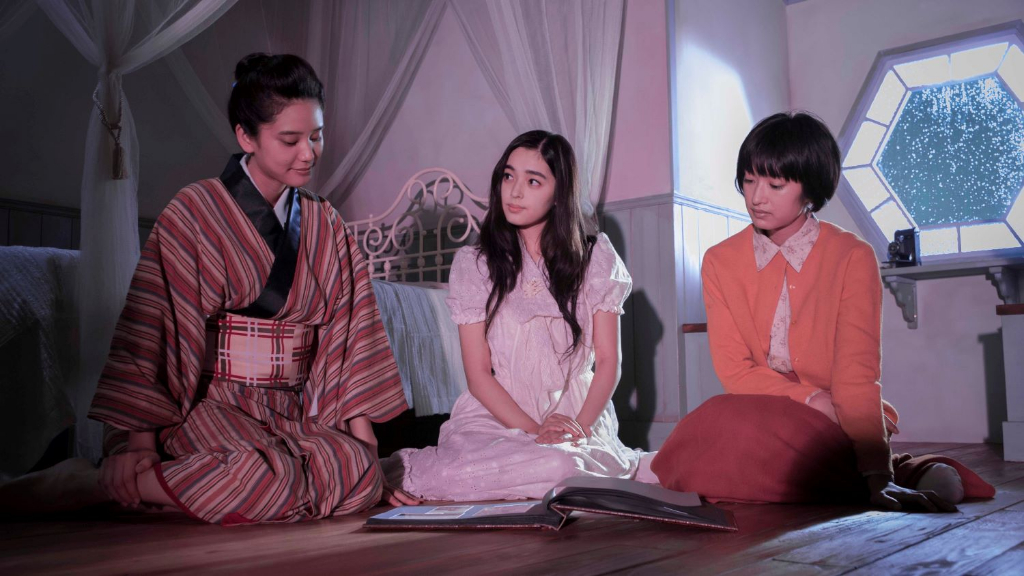Hanagatami

Back in the 1970s, the late Japanese director Nobuhiko Obayashi dreamed of bringing a coagulation of his own childhood experiences together with a story written by Kazuo Dan before the Second World War to produce a magnificent cinematic experience about the innocence of adolescence and the ugliness of war. This expedition of his hit the back burner as he began work on his directorial debut House, a comic horror feature for which he is, arguably, most renowned, and it has not been until 40 years later that his passion project has finally been brought to life. Four decades have seen incredible advancements in the world of cinema, so it could be argued that the longer the wait, the better for Obayashi. Indeed, better late than never, this is Hanagatami.
In the dawn of 1941, the Second World War was no longer in its infancy. Europe was being torn apart and desolated by gruesome battles. It is because of this that 16-year-old Toshihiko (Shunsuke Kubozuka) leaves his parents in Amsterdam for Japan, living with his aunt in Karatsu and attending the local school far away from the politics of war.
His aunt Keiko (Takako Tokiwa) cares full time for his cousin Mina (Honoka Yahagi), who, like her deceased brother before her, is suffering from tuberculosis. Despite being immersed in the glorious, mountainous countryside, a stone’s throw away from the crashing waves of Japan’s western coast, she finds herself restrained within the walls of the family home. Making friends with the other young people of the town, Toshihiko explores new relationships, activities and experiences, however the darkness of the war to end all wars continues to shroud the consciences of the adolescents.
Characters explode off of the screen with hyperbolised and caricatured personalities, almost mimicking those you would see in an anime cartoon, and with actors on screen who are clearly far older than their embodiments are supposed to be, Hanagatami makes for interesting viewing, to say the least. The wild acting on screen is countered by some far more serious undertones and themes of war, loss, grief and the destruction of virtue, striking a far more responsive chord with the viewer.
The story itself is very powerful and as a project the film is rather splendid, incorporating a number of experimental elements (no surprise given director Obayashi’s trademark pioneering status). Despite some seriously questionable use of green screen, the overall visual experience is mesmerising. The vision is there to see as these studio effects are thrown in with a mix of gloriously scenic cinematography and a beautiful score, making for an unusual yet endearing concoction.
However, as a whole, Hanagatami is too long and too tiresome, proving slightly laborious for a number of reasons. The editing is off the chart. The process must have been an excessively painstaking task, with the visionaries behind it dissecting up film less like a knife through butter than like cheese in a grater. Simply following what is on screen dominates the focus, making the 168-minute run time an exhausting process. This is coupled with a relentless onslaught of dialogue, as the film insists on verbally explaining to us what is going on, who is who and why they are doing what they are doing. In western cinema this is perceived as lazy, but in this case, it is more a matter of including more dialogue that is necessary. The viewer gets little respite in the way of action, making the complete viewing of Hanagatami wearisome and detracting from what could be some exceptionally moving scenes – a real shame, given the brilliance of other aspects.
Obayashi left us just this April, as a legend of the game and cinema in Japan, and it is a pleasure to see that Hanagatami has been getting released around the world since 2017. If you want to gorge on some East Asian cinematic culture, Obayashi’s videography is a marvellous place to start. He can effortlessly present the scene of two young men riding naked in the moonlight on a horse and make it seem right at home in a film about war.
Guy Lambert
Hanagatami is released on Blu-Ray on 9th July 2020.
Watch the trailer for Hanagatami here:

























Facebook
Twitter
Instagram
YouTube
RSS